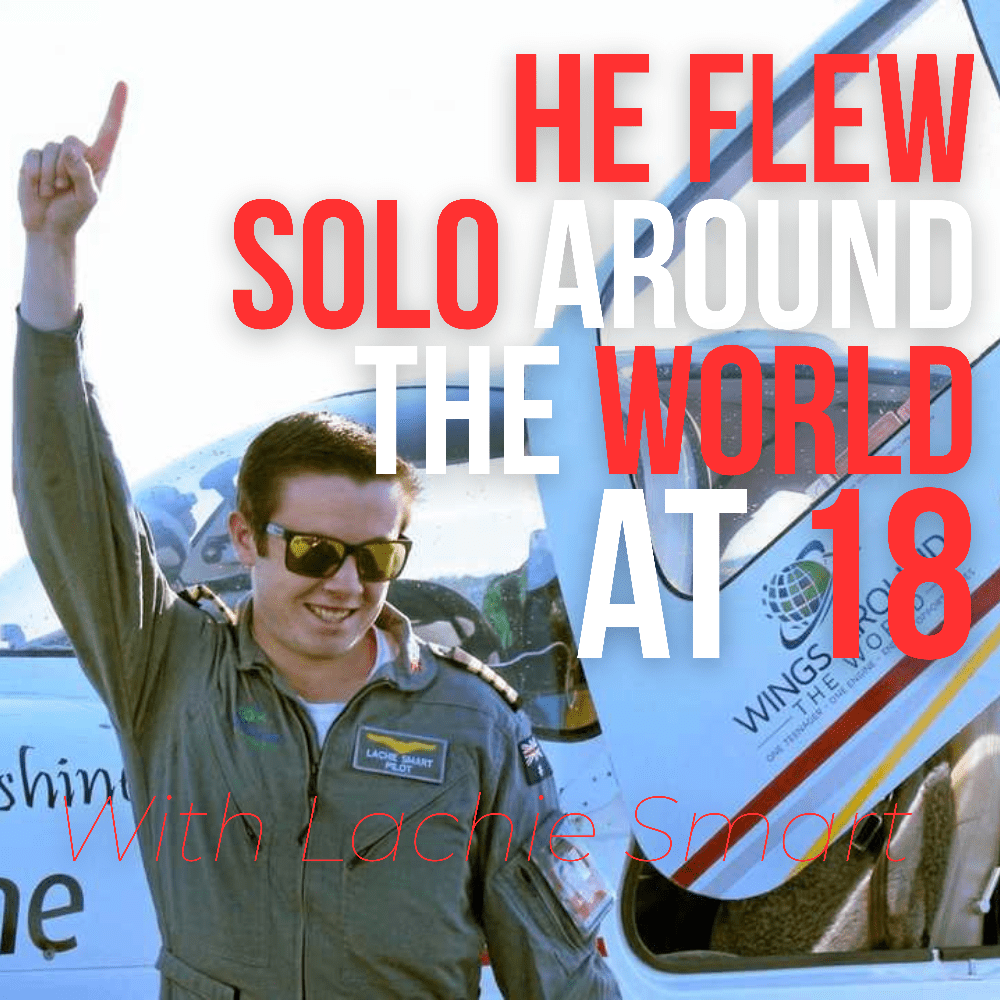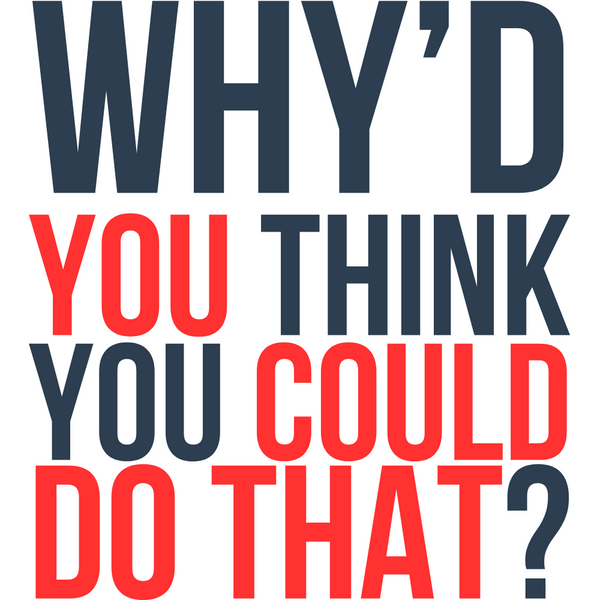
Lachie Smart Interview | Youngest Pilot to Fly Solo Around the World
Share
At 15, on a quiet Sunshine Coast evening, Lachie Smart turned to his mum at the kitchen table and said eight outrageous words: “I’m going to fly around the world.” No license. No money. No roadmap. Just a spark. Three years later, at 18, he lifted off alone in a single-engine aircraft and came home 54 days and 45,000 kilometres later as the youngest pilot to fly solo around the world.
Drawn from his full conversation with Sam Penny on Why’d You Think You Could Do That?, this long-form feature unpacks the real engine behind the record: facing fear in public, fundraising without status, fixing mistakes at 9,000 feet, and learning that bravery isn’t the absence of fear — it’s acting while fear sits in the cockpit.
By Sam Penny · · Read time: ~15–18 minutes
Watch the Interview



Kitchen-Table Spark: “Why Not Me?”
Some life pivots are a steady drift; others click into place in a single moment. Lachie’s was the latter. Watching a 60 Minutes segment about teenage aviator Ryan Campbell, a thought arrived that wouldn’t leave: if someone my age can do it, why not me? The line between fantasy and plan is thinner than we think — it’s the first public sentence. He said it out loud to his mum, got a chuckle that wasn’t a no, and began.
Importantly, the spark did not come packaged with skill or capital. He had barely touched a cockpit. No pilots in the family. No savings for training. From the outside, the idea looked like make-believe. From the inside, it looked like a question — and questions demand experiments. That’s the tone of his whole story: not “I knew I could,” but “I didn’t know I couldn’t, so I started.”
“I never thought I could. But I also never thought I couldn’t. That was enough reason to try.”
A Year of No: Sponsorship Pivots
Reality’s first test was money. Flying lessons, aircraft time, ferry tanks, avionics, permits, handlers, accommodation — the spreadsheet was a cliff. Lachie did what most of us do at first: he tried to sell “impressions” and “ROI” to marketing managers. Two hundred emails and pitch meetings later, he had exactly zero sponsors. The chicken-and-egg problem was obvious: no license, no plane, no proof, so no cheques.
The turn came when he threw out the deck and pitched values, not vanity metrics. A Brisbane law firm first offered pro-bono legals. Others followed: Garmin for navigation, Telstra for connectivity. Some brands said no for good reasons — no one wants their logo on a tail disappearing into the Pacific — but human beings inside companies said yes to a kid with a message they believed in: stop waiting to be “old enough.” The lesson for the rest of us: lead with meaning, and let the commercial terms follow, not the other way round.
The Ego Check Over Tasmania
Three weeks before launch, over the Bass Strait and onto Tasmania, Lachie met the moment that might have ended everything. Good winter weather and a run of clean flights had inflated his confidence. Pushing toward a gap that wasn’t a gap, he flew into a merging storm cell. Ice began to lace the wings. Static tore through the electrics. Non-essential systems dropped offline — including the satellite tracker that triggers alerts when the signal dies.
He wrestled the aeroplane to Launceston, taxied off the runway shaking, and pulled out a phone lit with missed calls. On the other end: a father in tears, certain his son had gone down. That night, a mentor’s blunt question redirected everything: “What exactly went wrong?” “The plane stopped working” isn’t an answer. Diagnosing with engineers, Lachie learned how to hard-reset systems and, more importantly, how to turn fear into a higher-resolution checklist. In hindsight, he calls it the lesson he needed: a hard, humbling boundary between confidence and cockiness.
Takeoff at 4:15am: Relief, Radios & a Lunchbox
Launch morning felt less like triumph and more like relief. Years of planning had produced a 4:15am clearance into dark sky, wingtip lights flashing off dew, a small team listening to the radio as he rolled. In the climb, his satphone lit up: not an emergency, but a text — he’d forgotten his lunchbox. Worse: the laptop bag beside it, with outbound flight documents. The small comedy of day one disguised real risk; the team scrambled the bag onto a commercial flight that beat him to Fiji. Systems and support make “solo” survivals possible.
13 Hours Over the Pacific: Fatigue & Focus
The longest leg, Hawaii to California, is a study in tight margins. Minimal sleep, a flap glitch after takeoff, then the long arithmetic of fuel burn, winds aloft, and time. There are no islands to drift toward if the numbers turn on you. The plane needed to crab on a curved great-circle path; the pilot needed to keep the mind from wandering while boredom and adrenaline took turns. He landed in Hollister with the first of two records (youngest solo Pacific crossing) and a deeper respect for invisible disciplines: hydration, micro-breaks, voice check-ins with the ground team — the boring habits that keep the improbable inside its safety envelope.
Sri Lanka: Bureaucracy, Bluff & a Warm Sandwich
Three-quarters through the route, the “easy half” (over land) proved harder. Heat over Saudi, dust and comms loss, turbulence injuries, a busted brake line in Oman, a near-zero-visibility arrival in Colombo — and then the phone call: the handler demanded cash on top of a wire they’d already insisted on, with the implied threat of blocking departure. At 2am, Lachie and a local friend drove to the plane. He took off early to avoid the trap, switching back to himself after days of just coping.
Crossing into new airspace, he opened a box that friend had packed — still-warm pastries and a layered cheese sandwich — and broke down. The scene explains far more than any headline: prolonged pressure doesn’t always snap loudly; it leaks until kindness pierces the armour and you feel how human you are. His response wasn’t bravado; it was a quiet decision: fly every day until home.
Indonesia: Maps, Mountains & Trusting Your Eyes
Indonesia provided one last practical exam. After a presidential movement closed the airport and ate the clock, ATC assigned a heading that — on paper — was clear. Ahead, a mountain said otherwise. When the controller insisted, he made the adult call: switch off the argument, fly the aircraft, and exit the problem before re-establishing contact. At the Sapta boundary he checked in with Brisbane control and heard the most welcome words of the entire flight: “Mate, welcome home.”
Homecoming: Water Arches & We Not I
The last approach lined up on the same runway he’d used for his first solo — a tidy circle that no longer exists after airport works. Fire engines made a water arch. His mum marshalled him in with charmingly chaotic paddles. On the ramp, he felt 15 emotions in a second — relief, gratitude, the quiet knowledge that he’d staked this message on the table: don’t dismiss the young; don’t wait for permission. Despite the “solo” record, he refuses the word “I” for the project. Tens of thousands of hands touched it; he was the lucky one with fingers on the yoke.
After the Record: Post-Goal Blues & Empathy
Landing isn’t closure; it’s a gear-shift your nervous system doesn’t expect. For a few weeks there were TV hits, air shows, speeches. Then the cycle moved on. The energy built for years had nowhere to go. He chased adrenaline — aerobatics, bikes, mountains — until mentors helped him redistribute ambition into business and speaking. The most surprising lesson came not in the air but at home: empathy.
When your reference point is a 13-hour ocean leg in a fire-retardant flight suit, it’s easy to dismiss someone else’s discomfort. Lachie caught himself doing exactly that with his mum’s broken car air-con — and a friend called him up on it. Wisdom from that moment: your lens is not the world. Don’t demand that others live under your thresholds. Meet people where they are, not where your story says they should be.
The Discomfort Method: Building Real Confidence
Across the transcript, one pattern repeats: deliberate discomfort builds capability. Childhood rock climbs and motorbikes; longer paddles to offshore breaks; early solo flights; then storms, bureaucracy and boredom at altitude. The doses scale, but the chemistry is the same. You don’t acquire confidence from a speech; you accrue it by keeping agreements with yourself under pressure. One step outside comfort, repeated, becomes a runway.
“Discomfort grows confidence. Fear doesn’t have to leave for you to act.”
And persistence beats certainty. He never had 100% belief. He did have 100% commitment to the next right action, supported by checklists, mentors and a team that could catch him before falls became failures. That is a replicable model for business, study, parenting — any arena where outcomes arrive late and doubt arrives early.
Your Turn: Spark, Struggle, Breakthrough
Turn the story into movement. Complete these three sentences — out loud or in your notes app:
Spark: I want to… I am going to…
Struggle: I am afraid that…
Breakthrough: Even though I am afraid of…, I will… anyway.
Examples you can steal to get started:
- I want to launch a service. I am going to pitch three beta clients this month.
- I am afraid that I’ll look silly. (Good. Name it. Now it’s smaller.)
- Even though I am afraid of failing publicly, I will post the offer anyway.
Clarity doesn’t arrive before action. It compounds because of it.
10 Lessons to Fly By
1) Start With the Sentence
The kitchen-table line turned a fantasy into a project. Say it out loud. You can iterate a sentence; you can’t edit a silence.
2) Pitch Values Before Vanity
“Impressions” didn’t move sponsors; meaning did. Lead with why it matters, then co-design the commercial how.
3) Engineer Redundancy
From avionics to admin, second options keep first dreams alive. Backups are not pessimism; they’re permission to proceed.
4) Convert Fear Into Checklists
Post-Launceston, fear became procedures — relays, breakers, flows. If it can be written, it can be rehearsed.
5) Respect Boredom
Long legs are won by hydration, posture, and small resets. Glamour doesn’t finish flights; habits do.
6) Kindness is Fuel
A warm sandwich at 30,000 feelings can re-humanise a mission. Build systems for small care in hard seasons.
7) Trust Your Eyes
When the map and the mountain disagree, believe the mountain. Instruments and institutions can err; responsibility is yours.
8) Say We, Not I
Solo is a misleading adjective. Mentors, mechanics, controllers, sponsors, family — success is plural.
9) Expect the Aftermath
Plan for Day +1. Post-goal blues are normal. Pre-build the next meaningful horizon and support cadence.
10) Train Discomfort Daily
Cold finish to a shower. A hard call made before noon. The tiny reps that make big reps possible.
Listen, Subscribe & Explore the Guest Hub
Watch the full conversation above, listen on your favourite platform, and explore quotes, prompts, and resources on Lachie’s Guest Hub.
